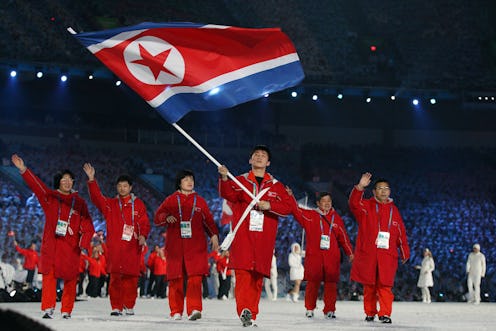
The 2018 Winter Olympics in PyeongChang, South Korea are about to kick off and, considering the countries' historic tensions, many are likely wondering if North Korea is going to the Olympics. Back in early January, North Korea did indeed decide to send a delegation to the Winter Games, following a groundbreaking meeting between representatives from the two countries at the demilitarized zone (DMZ).
North Korea's delegation includes "athletes, officials and a group of cheerleaders," so during the games you will see representatives from both Koreas competing alongside each other. More specifically, the country plans to bring 22 athletes to games, along with a 400-member supporting delegation.
North Korea did not participate in the 2014 Winter Olympics in Sochi, Russia, and initially was reluctant to send any athletes to the 2018 Olympics considering its tense relationship with South Korea. However, according to The Guardian, the two countries have managed to come together for the 2018 Olympic Games, which are being referred to as the "peace games" due to their capacity for (at least temporarily) unifying the Korean peninsula. The countries have agreed to march under one flag, known as the "unified Korea" flag, at the games' opening ceremony. Moreover, 12 women ice hockey players from North Korea will join South Korean players to compete as a unified Olympic team.
North Korea's attendance and camaraderie with the South at the Winter Olympics was certainly far from guaranteed, though, with the North waiting to commit to the games until early this year. Hope that North Korea would send some athletes first mounted when, in his annual televised New Year's address, North Korean president Kim Jong-Un stated that, “The year 2018 is a significant year for both the two Koreas, with the North marking the 70th anniversary of its regime establishment and the South hosting the Winter Olympics ... [The Olympics] serve as a good occasion to showcase the national pride and I sincerely hope it will be a success.”
Kim also noted that he would be willing to send a North Korean athlete delegation to South Korea, something which that country's presidential spokesperson, Park Soo-hyun, readily welcomed. Chang Ung, North Korea's representative to the International Olympic Committee (IOC), echoed similar sentiments at the time, saying on Jan. 6 that the country was "likely to participate" in the Winter Games.
North Korea's commitment to the Winter Games became official on Jan. 9, when both countries engaged in their first diplomatic talks in two years. The meeting took place at Panmunjom, a village in the demilitarized zone. The PyeongChang Olympic games were considered the top agenda priority at the talks, followed by inter-Korean relations.
During the meeting, where five officials represented each country, the North made a substantial commitment to attending the games. Indeed, as the BBC reported following the meeting, it agreed to dispatch "a high-level delegation, National Olympic Committee delegation, athletes, supporters, art performers, observers, a taekwondo demonstration team and journalists" to South Korea for the Games.
When North and South Korea came to an agreement regarding the North's attendance at the games, the president of the IOC, Thomas Bach, praised the countries for their collaboration, saying that North Korea's attendance was "a great step forward in the Olympic spirit."
This is not the first time North Korea has participated at the Olympic Games, although the fact that the Olympics are occurring in South Korea makes the hermit kingdom's attendance particularly noteworthy. North Korea first participated in the Olympics at the 1964 Winter Games in Innsbruck, Austria. Since then, the country has participated in every Summer Olympics, with the exception of the 1984 Summer Games in Los Angeles, which it boycotted alongside the Soviet Union. North Korea has sporadically participated in the Winter Olympics, skipping several of them over the years.
With its participation in the 2018 Winter Games, the country has a rare opportunity to engage in friendly competition on the world stage, allowing athletes from the reclusive state to showcase their talents. As the BBC reported last year, North Korea perceives "sports diplomacy" almost as an official policy of sorts, as it allows the country a non-political outlet to engage with other countries. The games will be a historic moment for both countries, as North Korean athletes compete for Olympic medals in South Korea — and march alongside them to open the festivities.